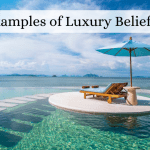
What’s the relationship between luxury beliefs and social status? This post explores how these beliefs operate as markers of status, their role in social stratification, and the broader implications for social flourishing. This article draws on two previous posts on the topic (here and here).
Mechanisms of Status Signaling
Luxury beliefs function as a sophisticated form of status signaling. Unlike traditional status symbols that rely on material visibility (e.g., cars, clothing), luxury beliefs are intangible indicators of one’s position within the social hierarchy. These beliefs often encompass progressive or avant-garde ideas about social, political, and cultural issues. They signal the holder’s access to certain forms of education and belonging to social circles that are not readily accessible to the general populace.
The efficacy of luxury beliefs is predicated on complexity and exclusivity. The beliefs themselves are frequently abstract, requiring a certain level of intellectual engagement that presupposes higher education or a specific socio-cultural background. This exclusivity ensures that only people with the requisite social and intellectual capital can spread these beliefs, thus reinforcing their status as elite members of a society (and, for that matter, any group since any sizable group can have elite members).
Luxury Beliefs as Social Stratification
Adopting and propagating luxury beliefs contribute to a nuanced form of social stratification. This stratification is less about economic capital and more about symbolic capital— the resources available to a person based on prestige, honor, and recognition within a specific social group. By aligning themselves with certain luxury beliefs, individuals can accrue symbolic capital, distinguishing themselves from others who either lack awareness of these beliefs or are unable to articulate them convincingly.
This form of stratification is insidious. It masquerades as intellectual and moral superiority rather than overt exhibitions of wealth or power. It divides those who are “in the know” and those who are not, often sidelining critical issues, like economic inequality, access to education, and social mobility. What emerges? A social landscape that exacerbates disparities not only through material means but also through ideological control.
Implications for Society
The relationship between luxury beliefs and social status has profound implications for social groups. On the one hand, these beliefs foster a sense of belonging and identity among those who share them, creating in-groups that bond based on a shared worldview rather than traditional markers of identity (such as race, class, or religion).
On the other hand, this same mechanism leads to social fragmentation. The separation of in-groups and out-groups becomes increasingly based on ideological lines.
Moreover, emphasizing luxury beliefs (as a means of status signaling) leads people to superficially engage critical social issues. When beliefs are adopted for their status-enhancing potential rather than genuine conviction, social dialogue can lack depth and fail to translate into meaningful action.
Such dissonance between belief and behavior not only undermines the authenticity of social interactions but also impedes our progress on the very issues that luxury beliefs purport to address.
Luxury Beliefs Shape Social Norms
Luxury beliefs play a pivotal role in shaping social norms and expectations. As these beliefs are propagated by individuals with significant social influence, they can quickly become benchmarks for what is considered enlightened or progressive thought.
This norm-setting function can have a dual effect: it can push social norms towards greater inclusivity and awareness, but it can also impose unrealistic standards that ignore the diversity of experiences and perspectives within society.
Do you see how luxury beliefs make pernicious power grabs? Those who control the narrative around which beliefs are considered luxurious exert significant power in shaping social values and priorities. As such, the relationship between these beliefs and social status is not merely a matter of personal identity or group affiliation; it reflects broader social structures and power relations.
Conclusion
By serving as intangible yet potent markers of social standing, luxury beliefs delineate new boundaries of inclusion and exclusion. They challenge traditional conceptions of status and belonging.
Understanding this relationship is crucial for deciphering culture and group dynamics. In many contexts, the battleground of status extends beyond the material into the realm of ideas and beliefs. As such, studying luxury beliefs and their impact on social status both equips us to minister more effectively in diverse cultures and protects us from manipulative belief systems within our society, churches, and organizations.
For a fantastic memoir that dives into this concept, check out Rob Henderson’s Troubled.













